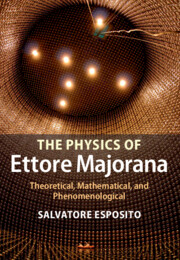Book contents
- Frontmatter
- Contents
- Acknowledgments
- Part I Introducing the character
- Part II Atomic physics
- Part III Nuclear and statistical physics
- Part IV Relativistic fields and group theory
- Part V Quantum field theory
- Part VI Fundamental theories and other topics
- 11 A “path integral” approach to quantum mechanics
- 12 Fundamental lengths and times
- 13 Majorana's multifaceted life
- Part VII Beyond Majorana
- Appendix Molecular bonding in quantum mechanics
- References
- Author index
- Subject index
11 - A “path integral” approach to quantum mechanics
Published online by Cambridge University Press: 18 December 2014
- Frontmatter
- Contents
- Acknowledgments
- Part I Introducing the character
- Part II Atomic physics
- Part III Nuclear and statistical physics
- Part IV Relativistic fields and group theory
- Part V Quantum field theory
- Part VI Fundamental theories and other topics
- 11 A “path integral” approach to quantum mechanics
- 12 Fundamental lengths and times
- 13 Majorana's multifaceted life
- Part VII Beyond Majorana
- Appendix Molecular bonding in quantum mechanics
- References
- Author index
- Subject index
Summary
From January to March 1938 – as we have seen in Chapter 1 – Majorana delivered his only lectures on quantum mechanics at the University of Naples, where he obtained a position as a full professor of theoretical physics. He prepared a set of lecture notes [26] for his students (see Section 13.5), and, among the original manuscripts of these lectures, we find some additional spare papers that cannot be considered as notes for academic lectures, even for an advanced course such as that taught by Majorana. Instead, as suggested in Refs. [328, 329], they probably refer to a seminar or conference held at the University of Naples, whose main topic was likely the theoretical interpretation of the molecular bonding in the framework of quantum mechanics; the notes were prepared by Majorana for his own personal use.
Scientific interest in this dissertation, however, focuses not on its main topic, nor on the calculations (which are practically absent from the manuscript), but rather on the interpretation given by Majorana to key concepts of the quantum theory, i.e. the concept of quantum state and the direct application of the quantum theory to the particular case of molecular bonding. The manuscript indeed discloses a peculiar cleverness on the part of Majorana in referring to this pivotal argument of quantum mechanics, and also reveals the concept was at least ten years ahead of its time. This link had been already noted earlier by Nicola Cabibbo [330], who saw in the Majorana manuscript a vague and approximate anticipation of the idea underlying the Feynman interpretation of quantum mechanics in terms of path integrals. A more analytic study has revealed, however, some intriguing surprises, upon which we will focus here.
In addition to the historical interest of Majorana's manuscript, we stress also the particularly powerful didactic method used by him on the given subject: his original presentation of the quantum-mechanical problems is exceedingly useful in teaching now those or related topics. For this reason, in the Appendix we will report the entire text (translated from the Italian) as prepared by Majorana.
- Type
- Chapter
- Information
- The Physics of Ettore MajoranaTheoretical, Mathematical, and Phenomenological, pp. 229 - 235Publisher: Cambridge University PressPrint publication year: 2014



